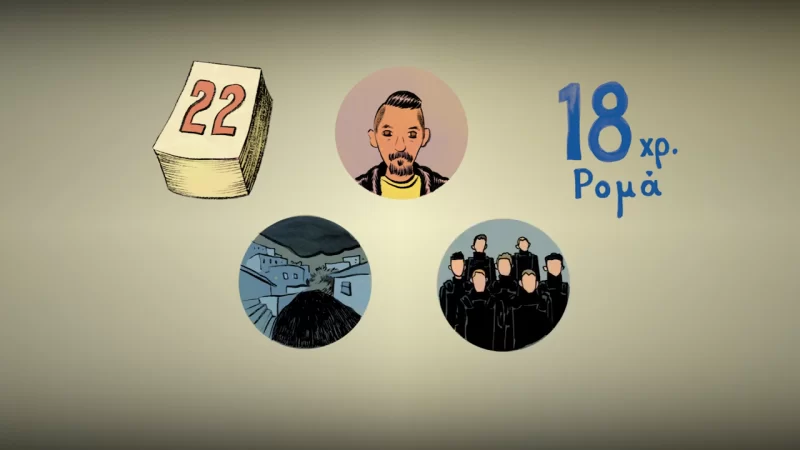
Police killing of Nikos Sampanis: Racial profiling and violation of the rules of police engagement



On the night of October 22, 2021, on Thebes Avenue at the intersection with Rentis, a white Hyundai fails to stop at a police checkpoint. It is noticed by the police, who give chase. The police team transmits on the radio: “Center, it isn’t stopping, three people inside, gypsies.”
The police team in pursuit suspect that the vehicle is stolen. However, the vehicle had not been declared stolen and the only offense committed at this time was that of disobedience, i.e. failing to stop when ordered to. As a result, the Hellenic Police operation center gave the order to stop the pursuit. The police teams in pursuit however, do not stop, and continue chasing the vehicle despite being repeatedly ordered to stop.
The car is forced to a stop in Perama by a passing bus and makes dangerous maneuvers to escape. In the middle of this residential area, the police then shoot at the car, discharging at least 36 bullets. The co-driver, Nikos Sampanis, was instantly killed, and the third passenger seriously injured. Stray bullets hit residential walls and parked vehicles. Despite police allegations that Nikos Sampanis was the driver of the vehicle, it was later confirmed that this was not the case, and that this was known to police all along.
The Hellenic Police rushed to issue a press release which reported that 7 police officers were injured in the incident. Neighborhood videos disprove this narrative. Evidence of a threat to life, which would justify the use of service weapons, does not appear even in the forensic reports. Furthermore, the stolen vehicle, which was the main source of evidence, has already been scrapped, without the knowledge of the Prosecutor’s Office.
Whilst police reports describe a 20-year-old Roma man who was killed while the police were shooting at the wheels of the vehicle, 18-year-old Nikos Sampanis had 3 injuries in the chest and another in the neck, while the 16-year-old passenger suffered a ruptured spleen. Police trade unionists claimed that the 3rd perpetrator who escaped was holding a weapon, which has also not been confirmed; this 14-year-old perpetrator has voluntarily appeared in court.
The Minister of Citizen Protection, Takis Theodorikakos, visits the seven police officers while they are being held at the police headquarters, whilst the Minister of Development and Investment publicly congratulates them via twitter. During their transfer to the courts, many of their colleagues called them “heroes,” while the president of the Special Guards (a body within the police force) stated: “The order to stop the pursuit was criminal, unacceptable and had no place in a modern police force.” When the decision not to detain the officers pending trial was made public, he stated that, “this decision unties the hands of the police.”
According to law 3169/2003: “The police officer is allowed to use a firearm, if this is required for the fulfillment of his duty and the following conditions are met:
The police officers, although now on trial for manslaughter offenses and attempted homicide, are on non-active police duty status.
This case is a classic example of racial profiling. According to the Open Society Justice Initiative, racial/ethnic profiling violates the basic principle that law enforcement actions should correspond with an individual’s conduct, not their identity. This practice leads to the violation of core international treaties that protect fundamental rights.
It also violates European and domestic laws, including the right to: • prohibition of discrimination • freedom of movement • liberty and security (when police use force) • freedom of religion (fear to practice religion because of risks of being stopped) • privacy (pat down and search can be invasive; stops create an element of coercion and humiliation and embarrassment).
The United Nations, Council of Europe, and the European Union have issued multiple recommendations to end ethnic profiling. Particularly problematic for the rule of law in this case was the political support provided from the first moment by the relevant Minister and other government officials, as well as the failure to suspend the accused, despite the seriousness of the incident.
Bank Account number: 1100 0232 0016 560
IBAN: GR56 0140 1100 1100 0232 0016 560
BIC: CRBAGRAA
![]()
In a time where the very foundations of democracy are gradually being eroded by the rise of extreme nationalism, alt-right movements, the spread of disinformation and corporate capture, the efforts of organisations such as Vouliwatch are more relevant than ever.
We rely on the generosity of each and every one of you to continue with our efforts for more transparency and accounta
By financially supporting Vouliwatch you support our litigation strategy, our campaigns for transparency and accountability in the political system, the development of new civic tech tools, our research projects and last but not least our impartial and accurate